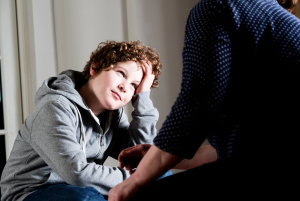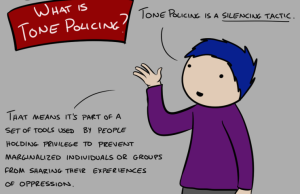Middle schoolers are having sex.
Sounds a bit like a tabloid headline, doesn’t it?
Partly, that’s because just the idea of the 6th through 8th grade set having sex makes a lot of us really uncomfortable.
And there are a few reasons for that.
One is that this age group often seems much more childlike than adolescent. Plus, there are concerns about health issues like unintended pregnancy and sexually transmitted infections.
People also bring their own worries about emotional trauma, as well as the moral impact, of early sex to the table.
And additionally, many of us assume (thanks to media-induced fear-mongering) that the earlier someone starts having sex, the more likely they are to end up involved in everything from drugs to crime.
And while I can assure you that early sex does not a later criminal make, a lot of the concerns around early sex are, indeed, valid and understandable.
But when you combine these collective worries – whether legitimate or overblown – with the ever-present claim that kids today have invented sex and all its attendant problems (for the record they haven’t; according to the CDC, the number of youth who had sex before age 13 decreased from 10% on 1991 to 5% in 2013), a sexually active middle schooler can seem like an automatic crisis.
But here’s the thing: It doesn’t have to be.
It doesn’t.
Yet, a lot of parents get pretty upset thinking about a middle schooler having sex – to the detriment of the situation. How can we have clear, honest, open conversations with our middle schooler about sex when we’re confused, hurt, or angry from the start?
And this is why understanding a bit about why this happens – and how to talk to kids when it does – will go a long way towards helping families navigate this territory in a healthier manner.
So, What Do I Need to Know About Middle Schoolers?
1. Social Influences Matter – And We’re Not Just Talking About Peer Pressure
At some point during puberty, a lot of young people will start to care more and more about what their peers think – and they’ll care about this way more than they had previously. And understandably, this can be annoying for a parent who doesn’t quite “get” the new importance of a friend group.
But the fact is, this is a normal part of adolescent development and one way that preteens and teens demonstrate their growing independence. This part of development even has its own psychological definition: “identity vs. role confusion.”
What this can translate to on the sex front is that a middle schooler whose friends are sexually active may determine that sex will lead to greater peer acceptance and support – the same way that a middle schooler whose friends are into Such-and-Such a Band might want to download their latest album to “fit in.”
And this isn’t peer pressure, which a lot of us assume is the usual factor that impels kids to do things many adults don’t approve of.
Rather, it’s as simple as a motivation and reward system: “To get x, I should do z.”
And we need to take this for what it is – an entirely healthy aspect of adolescent development – rather than twisting it into something it’s not.
So, if this is the case with your middle schooler and their friends, have a conversation that recognizes that it’s not always peers exerting pressuring, so much as it’s a kid themself choosing to take actions to help them fit in.
This is more likely to resonate than a conversation where you position your child as the weak victim of bullying if this isn’t how a kid identifies.
2. It’s All in Their Heads – Literally, Their Brain Functioning Plays a Role Here
There are a few things we need to know about brain development.
One is that researchers have found that adolescents aren’t reckless because they underestimate risks, but rather because they overestimate rewards – something that can be partially attributed to the fact that the reward centers of the adolescent brain are much more active than those of children or adults.
Then there’s the impact of the prefrontal cortex, which concerns motivation and emotion, and which inhibits impulses and guides decision-making.
The prefrontal cortex develops through learning and becomes more effective through experience.
But when it comes to sex, we don’t give kids a lot of ways to learn (like by making mistakes) and correct them. So the development in this area is often less effective than it is in places where kids get regular practice.
And then there is the role of working memory. Working memory allows people to draw on and use information they have stored to make decisions.
It is also related to impulsivity.
What does this have to do with middle schoolers and sex?
For some kids, the choice to become sexually active appears to be related to how their working memory functions.
In fact, a recent study of 12-to-15 year olds found that participants with less developed working memories were more likely to have sex at a younger age and that that sex was less likely to be protected.
Now, we shouldn’t all throw up our hands and assume that a 7th grader who forgets her lunch every day, or that an 8th grader who can’t remember to walk the dog, is about to jump into the sack with every classmate they see.
The same study found that working memory is not the only factor affecting a younger teen’s decision to have sex, and that the role of parents, community, and a whole host of other factors also come into play.
But oftentimes, we view early sex as a question of morality – which can be an unfair (and not to mention oppressive) assumption.
That’s why it’s important to understand that it can also be viewed as a matter of brain development.
3. Formal Sexuality Education Really Does Make a Difference
There are two important things to realize about the impact of sex education.
The first is that sex ed matters.
A study done by the reproductive health organization The Guttmacher Institute found XX that compared to their peers who don’t get formal sex education, youth who do are typically older the first time they have sex, are more likely to use condoms or other contraceptives when they do, and also have healthier partnerships.
Since a lot of students in the United States only get sex education later in high school, if they get it at all, the result is that plenty of kids are having sex long before they ever learn anything formally about it. This also contributes to them having sex at earlier ages than they would otherwise!
And yet, many people make the (incorrect) assumption that formal sexuality education in schools or communities simply leads to more young people having sex. And while perhaps that’s a fair concern, it actually completely goes against what research tells us.
So if you’re really concerned about kids having sex in middle school, advocating for early comprehensive sex ed is actually one of the best ways to help them delay doing so.
The second thing to consider – and I say this as someone who has taught this subject for the past 15 years – is that even the most comprehensive sex education (yes, even that which is delivered long before sexual activity with a partner is ever on the table) isn’t going to change the behavior of every single kid.
And this doesn’t make sex education is useless. At all. But it’s important to understand that – just like anything else in the world – knowledge doesn’t always transform behavior.
But it can.
So, How the Hell Am I Supposed to Talk to My Kid?
Saying something to a sexually active middle schooler assumes that you actually know that a kid is having sex!
That, in and of itself, can be complicated – because younger kids are the least likely to reveal the fact that they’re sexually active to an adult (and given all of the misconceptions and stereotypes and lack of support, can you blame ‘em?).
As a result, they may be at increased risk for unwanted pregnancies, sexually transmitted infections, and coercive sexual experiences – which is exactly why we need to be starting these conversations if they aren’t.
But how?
I know. This feels daunting.
How can you get a kid to open up you about one of the most personal topics out there?
Well, there is no one magic tactic, but making yourself available (check out this resource on how to become an askable adult), having an initial conversation about sex that has nothing to do with your child’s behavior, and keeping any anger you feel in check are good places to start.
And once you’ve laid that groundwork, it’ll probably be easier to address your child’s specific situation.
And to help you think through that, here are three ways to do that.
1. Figure Out What You Want Out of the Conversation
Before you even sit down to talk with your middle schooler, it’s a really good idea to ask yourself what your actual goal is.
Do you want the kid to stop having sex altogether? Do you want them to practice safer sex and ensure that any sex they are having is both desired and enjoyable? Do you want both of those things at the same time?
Though that might seem incompatible, it’s okay to tell your child if you feel conflicted. It’s okay to be honest with your child about how you feel, period. And it’s okay to admit that you don’t have all the answers.
It’s also important to remember that our children don’t always share our values. And while your child is still that – a child – it’s important to remember that they are now (slowly, but surely) growing into adults. And part of this stage of development means that they’re working out what their own individual values are.
Thus, make your own values clear while explaining that you’re aware that they might see things a bit differently.
This lets kids know that you see them as individual humans – and not only as extensions of yourself, your family, and your community.
2. Empower Your Middle Schooler to Make Choices
Remember when your child was a toddler, and you were advised that giving them choices would help them feel in control?
Try to channel that advice for your sex conversation.
Sure, a 13-year-old’s choice to have sex might seem a little more serious than a three-year-old’s choice to wear the blue sweatshirt instead of the red one.
But letting a middle schooler feel like they have agency, especially over their own body, can actually help them avoid doing things just to assert independence from their parents in harmful ways.
So how can you let a middle schooler feel like they can make their own choices, but still steer them in a direction you think is best for them (since, after all, they may be growing into an individual, but it’s still your duty to take care of them)?
One way to do that is to get your middle schooler to consider the impact sex is having on their life in a way that is respectful, but also thought provoking.
Here are some questions towards this goal that your child can try to answer – either with you or by themself:
How has having sex affected your relationship with your partner?
Did having sex end your relationship? If so, how did that feel?
Are you having sex because you’re worried that your partner will break up with you if you don’t?
Do you know how to practice safer sex?
Do you feel comfortable seeing a doctor and getting tested or treated for STIs?
What is your definition of sex? What types of sex play are you comfortable with?
Are you comfortable telling your partner your likes and dislikes?
Would you feel comfortable telling your partner if something didn’t feel good?
If something goes wrong or you have an emergency, do you have an adult who you can talk to? If it isn’t your parents or guardians, who is it?
Has having sex changed your relationship with your parents or guardians? How do you feel about that?
Do you feel pressured to have sex?
Do you think you pressured your partner into having sex?
Sometimes parents lament that since a kid has already had sex, there’s no point in discussing the option not to do so – or how to do so differently.
But the simple fact that a middle schooler has had sex before doesn’t mean that they have “lost” anything, or made some irreversible choice that that they have no way out of.
A lot of young people who have had sexual experiences don’t have sex regularly and don’t consistently remain sexually active.
So there’s plenty of time for middle schoolers to assess their current situations and decide whether they want to make any changes – and you can help guide them toward understanding their own needs and motivations.
3. Be Prepared to Center the Conversation on Consent
Sadly, a lot of what we perceive as mutually voluntary sex doesn’t actually fit the definition of a consensual encounter.
Middle schoolers – whether they’re sexually active themselves or not – need to understand what consent actually looks like, especially in a culture that so often guides them away from it.
To help your middle schooler avoid any confusion, then, a few things should be crystal clear:
Agreeing to be sexual with someone else has to be mutual, explicitly stated, and not done under pressure.
It is not possible to agree to sex when under the influence of substances, when someone is asleep, or when someone is passed out.
Consent can be withdrawn at any time and for any reason. For example, telling someone at school that you’ll fool around with them later doesn’t mean that you actually have to do so when the time comes! This also means that you can start hooking up with someone, but decide to stop in the middle.
Just because you’ve hooked up with someone before, that doesn’t mean that you ever have to do so again, or that a past sexual partner has any right to expect future sexual encounters.
Most states and countries have age of consent laws that make it a crime for someone over this age, usually between 16 and 18, to have sex with someone under this age, even if the younger person says they want to have sex.
Talking about consent can feel somewhat counterintuitive if your main goal (see #1) is to have your middle schooler stop having sex altogether. But conversations around consent should be happening at all ages.
Importantly, there is a huge difference between a middle schooler having consensual sex with a peer their own age, and a kid who is coerced into sex.
But so many of us are confused by the whole issue of consent that we often muddy the waters when discussing this topic.
Until parents and kids determine whether the sex a middle schooler is having is truly consensual, any conversation about the issue is going to be tough.
But it has to happen.
***
There is a reason “middle” school is termed just that.
It’s a bridge stage between childhood and the teens years.
And as such, middle schoolers need simultaneously to be guided as children and respected as autonomous beings – yes, even around sexuality.
And understanding a little about what kids this age are experiencing can go a long way towards understanding their motivations, desires, and boundaries around sex.
And regardless of whether we support their choices or not, when we avoid making snap judgments about what they’re doing and why, the better all of our relationships will be.
[do_widget id=’text-101′]
Ellen Kate is a Contributing Writer for Everyday Feminism. She’s a health educator, sometime writer, and mom. She has worked at Manhattan’s Museum of Sex, developed sex education curricula in Mumbai, India, and run HIV prevention programs for at-risk teens in the South Bronx. Currently, Ellen teaches human sexuality at Brooklyn College (something she also did at Rutgers University). Ellen also runs About.com’s LGBT Teens site. More of Ellen’s writing can be found here. Follow her on Twitter @ellenkatef.
Search our 3000+ articles!
Read our articles about:
Our online racial justice training
Used by hundreds of universities, non-profits, and businesses.
Click to learn more





















